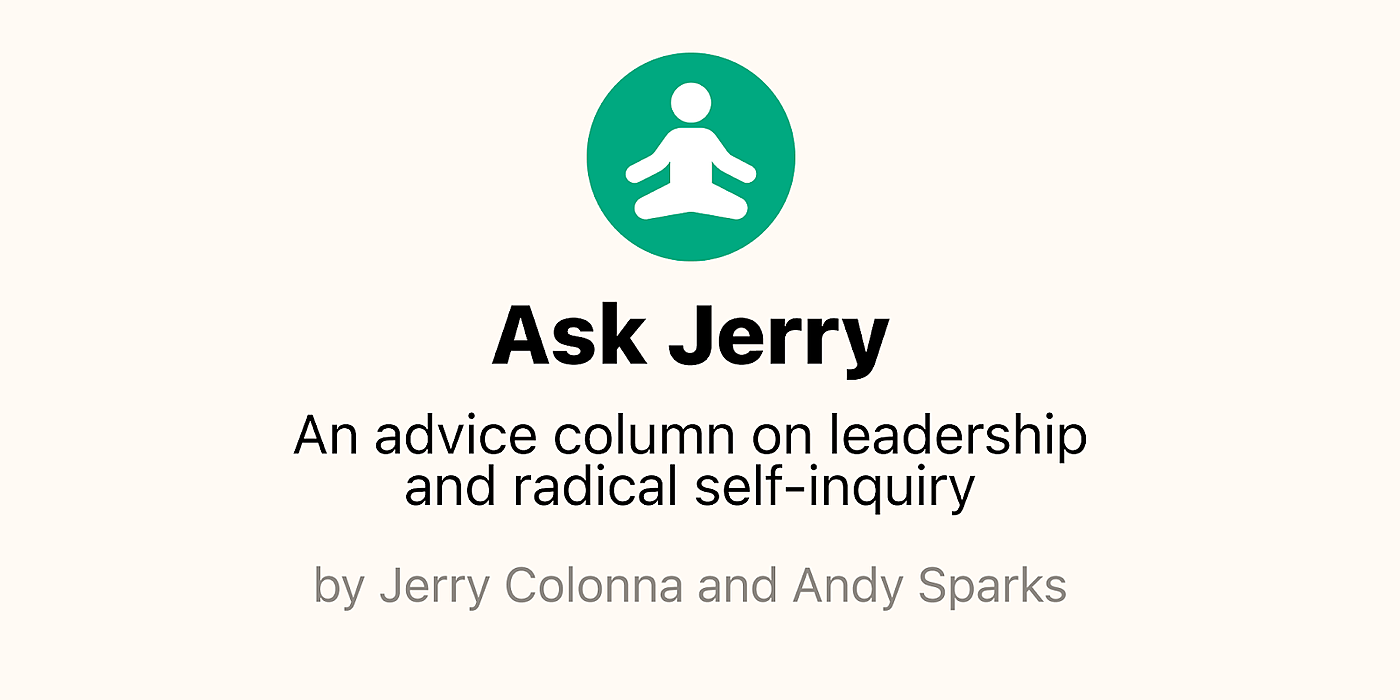
Announcing “Ask Jerry”
A new advice column on leadership and radical self-inquiry
October 27, 2020 · Updated January 25, 2026
TLDR — Jerry Colonna, the author of Reboot: Leadership and the Art of Growing Up and CEO of executive coaching and leadership development firm Reboot, is teaming up with Andy Sparks, coach-in-training and co-founder of Holloway and Mattermark, to write a weekly advice column that explores the psychological patterns that cause our highs and lows, and wins and losses.
Because you’re already a subscriber, all you have to do is go to your account page and tick the checkbox next to “Ask Jerry” in order to follow along:
Lately I’ve been crying a lot. But not in a bad way. In a healing way.
Take, for example, the Ted Lasso incident. One minute I’m sipping a malbec, enjoying what I thought was a vapid goofball comedy — and the next I’m sobbing into my wife’s shoulder, confessing that I’m often more focused on the goal than on the team, and that I often inhabit a sort of hyper-rational mode because I’m afraid to show the people I work with how much I care about them.
Maybe I just need more sleep. Ok, I definitely do. But also, I think something deeper is going on.
I’ve come to believe that work is more emotionally difficult than our culture makes it out to be. We’re supposed to just plug in, but it rarely works that way. Instead we feel resentful, or scared, or bored.
The common solution is to stop caring so much, to not invest so much of yourself in your work. But that’s not what most of us really want. We want to bring our whole selves to work. To see our fingerprints in what we produce. To feel a kinship with our team.
So the choice is either to push it down and cope with the feeling that we’re missing something, or to investigate it. Jerry calls this latter path “radical self-inquiry.”
The premise, as I understand it, is simple: the more you understand your feelings, the less your feelings control you.
The more we can identify and work with emotions — inside ourselves and inside of others — the more rewarding work can be. Often this is what’s really going on inside teams that win. They’ve figured out how to click into gear because they understand themselves and each other.
But this clicking thing doesn’t happen automatically. It’s not cheap or easy. It requires work — work that’s often painful. It requires courage, insight, and honesty.
And yes, one common side effect is “cathartic ugly crying” 😭😅
If this journey sounds worthy to you, if you’re the type of person who understands the true value of self-discovery, then you’re in luck. Because Jerry Colonna is here for you, and he deeply knows his shit.
Jerry has coached hundreds of founders, and helped hundreds of thousands more through his book and podcast. In the intro to his book, his basic method is explained as an “unusual yet highly effective blend of Buddhism, Jungian therapy, and entrepreneurial straight talk to help leaders overcome their own psychological traumas.”
Each week, Jerry will sit down with Andy Sparks, a coach-in-training who previously was the co-founder and CEO of Holloway (and co-founder and COO at Mattermark before that), to answer your questions and guide you towards using work as a vehicle for fulfillment.
To join us each week, subscribe now:
As a reminder, clicking this button will take you to your account page, where you can tick the box next to “Ask Jerry” in order to follow along.
A preview the first post
Want a preview of Ask Jerry? Here’s an excerpt from the first edition, “On Co-Founder Resentment”:
Jerry Colonna on Co-Founder Resentment
In this inaugural edition, we chose a question from the community (send us yours here!) about resentment between co-founders, a familiar challenge to those who sign up to work together. Jerry shares his thoughts on what's at the root of resentment between co-founders and how to address it.
My co-founder is the CEO. I work just as hard as they do, but I have less equity. How do I manage my feelings of resentment?
Jerry Colonna: I recognize this feeling of resentment. And I want to start by saying I totally understand the feeling, and it's hard—it is really, really hard.
Implicit in this question is a premise: that there is a structural way to solve for resentment. In other words, it's implied that if I could wave a magic wand and give the founders the same amount of equity, then the resentment would go away.
But my experience is that this kind of structural fix doesn't actually solve the resentment.
If I want to understand the actual cause of resentment in a relationship like this, I generally ask, “When was the decision made about equity? What was that conversation like?”
Why? There are many reasons co-founders choose to split equity unequally, and learning about these reasons will, more often than not, reveal the power inequities in the relationship. These power inequities are the true source of resentment in co-founder relationships.
The Only Subscription
You Need to
Stay at the
Edge of AI
The essential toolkit for those shaping the future
"This might be the best value you
can get from an AI subscription."
- Jay S.
Join 100,000+ leaders, builders, and innovators

Email address
Already have an account? Sign in
What is included in a subscription?
Daily insights from AI pioneers + early access to powerful AI tools








Comments
Don't have an account? Sign up!